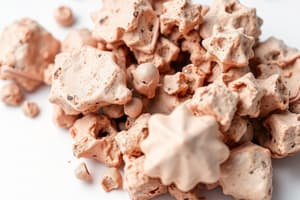Podcast
Questions and Answers
What is matter?
What is matter?
Matter is any material that occupies space and has mass, including all solids, liquids, and gases.
Which of the following is an intensive property?
Which of the following is an intensive property?
- Length
- Mass
- Volume
- Density (correct)
Malleability is the ability of a substance to be stretched into a wire.
Malleability is the ability of a substance to be stretched into a wire.
False (B)
What is ductility?
What is ductility?
What is solubility?
What is solubility?
What is freezing point?
What is freezing point?
What does density measure?
What does density measure?
What is the boiling point of a liquid?
What is the boiling point of a liquid?
Extensive properties depend on the amount or quantity of matter.
Extensive properties depend on the amount or quantity of matter.
What is mass?
What is mass?
What is volume?
What is volume?
What does flammability measure?
What does flammability measure?
What occurs during oxidation?
What occurs during oxidation?
What intensive property can be observed when a person sneezes in a closed room?
What intensive property can be observed when a person sneezes in a closed room?
What should be done to avoid spreading droplets after sneezing?
What should be done to avoid spreading droplets after sneezing?
Flashcards are hidden until you start studying
Study Notes
Properties of Matter
- Matter encompasses all materials that occupy space and possess mass, including solids, liquids, and gases.
Classification of Properties
- Properties of matter are classified into physical and chemical properties.
- Physical properties can be observed without altering the substance's chemical composition.
Intensive Properties
-
Intensive properties are traits that do not depend on the amount of substance present.
-
Temperature: A measure of the warmth or coldness of a substance.
-
Malleability: The ability to be hammered or transformed into thin sheets.
-
Ductility: The capacity of a material to be stretched into a wire.
-
Diffusion: The process of matter spreading out or being dispersed.
-
Solubility: The degree to which a substance can dissolve in a solvent.
-
Freezing Point: The specific temperature at which a liquid transitions to a solid.
-
Density: The mass of a substance relative to its volume.
-
Boiling Point: The temperature at which a liquid’s vapor pressure equals atmospheric pressure.
-
Magnetism: The ability of a material to experience a magnetic attraction.
-
Electrical Properties: The capacity of a material to conduct electric current.
Extensive Properties
-
Extensive properties depend on the quantity of material present.
-
Mass: Measurement of the amount of matter, typically expressed in grams or kilograms.
-
Volume: The amount of space a substance occupies.
-
Length: A measurement of distance.
Chemical Properties
-
Chemical properties describe how matter reacts when interacted with other substances.
-
Flammability: Indicates how quickly a material can catch fire.
-
Oxidation: Occurs when a substance loses electrons during a reaction.
Specific Examples
- Water freezes at 0°C.
- Coal is burned to produce electricity for generators.
- Salt and refined sugar share a white coloration.
- 5 kg of rice and newly harvested cotton weigh the same.
- Silver tarnishes when exposed to air, forming silver oxide.
Practical Consideration
- When sneezing in a closed room, diffusion allows droplets to travel and potentially reach others.
- To avoid spreading germs when sneezing, turn away or use a tissue to cover the mouth and nose.
Studying That Suits You
Use AI to generate personalized quizzes and flashcards to suit your learning preferences.




